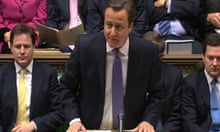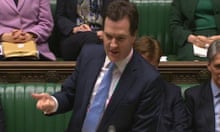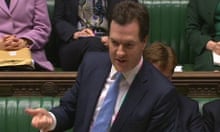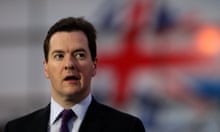Two former Conservative chancellors have issued grave warnings about the British economy as the government braced itself for the pound to slide following the loss of the UK's coveted AAA credit rating.
Sterling is expected to fall against other major currencies as the financial markets respond to Moody's decision on Friday evening to cut the national credit rating, repeatedly used by the chancellor, George Osborne, to validate his tough economic measures, by one notch to AA1.
While clearly supportive of the coalition's austerity programme of deep public spending cuts, the two senior Tories, Kenneth Clarke and Lord Lawson, both cautioned that the UK was vulnerable.
Clarke, now minister without portfolio in the cabinet, defended Osborne's previous claims that the government's economic policy could be judged on its credit rating, arguing that problems with the global economy and particularly in the eurozone had pushed recovery "several years" beyond what had been expected at the general election in 2010.
"It seemed perfectly sensible to me at the time," Clarke told the Sky News Murnaghan programme. "It would now if it were not for the fact that it is quite clear that the global economic and financial crisis is persisting, it's worse than we thought, several more years are required."
Speaking on the same programme, Lawson said it was vital that ministers and the Bank of England made no suggestions they would like to see a further weakening of the value of the pound – which could help boost exports by making British goods cheaper for foreign customers – in case it prompted "a run on sterling".
"That would not be clever, that would not be sensible, that would not be helpful," said Lawson. "But I don't think that George Osborne wants that."
The pound has already come under severe pressure this year as investors questioned the UK's reputation as a safe haven from the economic woes in the eurozone, falling 7% during 2013 to close at $1.516 against the US dollar on Friday evening. Sebastien Galy, senior currency strategist at Société Générale, predicted it would slide to $1.50 within the next couple of days, and as low as $1.46 in the longer term.
Galy, though, did not see a full-blown sterling crisis.
"It's not a run on the pound in a deeply negative sense," he explained.
Moody's downgrade seems set to dominate when parliament resumes after its half-term break on Monday, with Labour expected to raise the issue at the weekly prime minister's questions on Wednesday, and suggestions there could be a formal statement from Osborne before that.
The chancellor is expected to face calls at a hearing of the banking commission, where he is due to appear on Monday, for him to take a tighter grip on the banks to boost lending and growth as part of a wider plan B.
Significantly for the coalition, however, Moody's also said that following months in which the UK had been under the threat of such a downgrade, the outlook was now "stable" – citing the government's commitment to its austerity spending cuts as a chief reason for that judgment.
Gemma Godfrey, head of investment strategy at Brooks Macdonald, which manages over £4.6bn of assets, said investors wanted to see Osborne announce new infrastructure spending in next month's budget.
"The markets are more focused on growth than on deficit reduction … As an investor in a low-growth environment, you're looking for any areas that can give you growth," Godfrey said. "The emphasis should be to kickstart growth, because without growth our debt levels will be very hard to manage."
Godfrey pointed out that infrastructure spend is classified as "capital" not "current" spending, giving Osborne the opportunity to announce fresh spending plans.
"The risk is that too great a focus on deficit reduction could further squeeze the economy and domestic corporate revenues," she added.
Economists also fear a weaker pound will drive up the cost of living in the UK. "The danger is that the pound falls too far and becomes a serious inflation concern. Also, a sharp fall in the pound would not be good for confidence," said Howard Archer, chief UK economist at IHS Global Insight.
The Liberal Democrat business secretary, Vince Cable, told BBC1's Andrew Marr programme the rating change was "largely symbolic", adding: "In terms of the real economy, there is no reason why the downgrade should have any impact."
Despite the attempt to rally around the chancellor, however, some Tory MPs suggested there was growing dissent in the party.
Adam Afriyie, the Windsor MP who has been the subject of reports that he is building up a leadership challenge bid if the party loses the 2015 general election, wrote in the Mail on Sunday that the coalition was "in the last chance saloon" and warned that the budget on 20 March was "a final opportunity to devlier deliver real growth before 2015", before setting out a series of policy suggestions including widespread tax cuts. Peterborough Tory MP Stewart Jackson took to the social networking site Twitter to say: "Adam Afriyie is writing what many Tory MPs are thinking. Over to you George …"
Other colleagues in the House of Commons disputed the challenge, however. Nadhim Zahawi, the founder of polling company YouGov and a leading rebel over House of Lords reform, predicted the downgrade would not hit the interest rates for UK government debt, which was the key importance of the credit rating. "We are still borrowing £426m a day," added Zahawi. "To abandon fiscal constraint now would be deeply wrong."










Comments (…)
Sign in or create your Guardian account to join the discussion